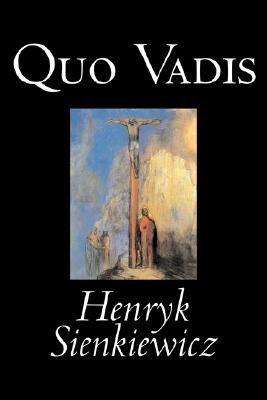| Quo Vadis by Henryk Sienkiewicz, Fiction, Classics, History, Christian Contributor(s): Sienkiewicz, Henryk (Author), Curtin, Jeremiah (Translator) |
|
 |
ISBN: 1598182897 ISBN-13: 9781598182897 Publisher: Aegypan OUR PRICE: $39.56 Product Type: Hardcover - Other Formats Published: December 2006 Annotation: The Latin phrase, "Quo Vadis?" means "Whither goest thou?" It is a phrase of great meaning to Christians. The author of "Quo Vadis," Henryk Sienkiewicz, was awarded the Nobel Prize for literature in 1905, and the enduring popularity of "Quo Vadis" contributed greatly to the award. Set in Rome in the time of Nero, "Quo Vadis" tells the story of Roman tribune Marcus, who falls in love with a beautiful Christian girl, Ligia. Sienkiewicz studied Roman history extensively before writing the book, and it features real historical figures, including St. Peter, Petronius, and the Emperor Nero. "Quo Vadis" tells a powerful tale of love and redemption in a time of ultimate danger -- for Christians and Romans alike. |
| Additional Information |
| BISAC Categories: - Fiction | Classics - Fiction | Fantasy - General - Fiction | Christian - Historical |
| Dewey: FIC |
| Physical Information: 1.13" H x 6" W x 9" (1.76 lbs) 452 pages |
| Themes: - Religious Orientation - Christian |
| Descriptions, Reviews, Etc. |
| Publisher Description: Quo Vadis tells a powerful tale of love and redemption in a time of ultimate danger -- for Christians and Romans alike. "Quo vadis Domine" is Latin for "Where are you going, Lord?" and alludes to the apocryphal Acts of Peter, in which Peter flees Rome but on his way meets Jesus and asks him why he is going to Rome. Jesus says, "I am going back to be crucified again", which makes Peter go back to Rome and accept martyrdom. It is a phrase of great meaning to Christians. The author of Quo Vadis, Henryk Sienkiewicz, was awarded the Nobel Prize for literature in 1905, and the enduring popularity of Quo Vadis contributed greatly to the award. Set in Rome in the time of Nero, Quo Vadis tells the story of Roman tribune Marcus, who falls in love with a beautiful Christian girl, Ligia. |
Contributor Bio(s): Sienkiewicz, Henryk: - "Henryk Adam Aleksander Pius Sienkiewicz (1846 - 1916) was a Polish journalist, novelist and the Nobel Prize laureate. He is best remembered for his historical novels, especially for his internationally known best-seller Quo Vadis (1896). Born into an impoverished Polish noble family in Russian-ruled Congress Poland, in the late 1860s Sienkiewicz began publishing journalistic and literary pieces. In the late 1870s he traveled to the United States, sending back travel essays that won him popularity with Polish readers. In the 1880s he began serializing novels that further increased his popularity. He soon became one of the most popular Polish writers at the turn of the 20th century and numerous translations gained him international renown, culminating in his receipt of the 1905 Nobel Prize in Literature for his "outstanding merits as an epic writer.""Curtin, Jeremiah: - "Jeremiah Curtin (6 September 1835 - 14 December 1906) was an American translator and folklorist. Harold B. Segel writes about Curtin's translations of works by Henryk Sienkiewicz: . . . Curtin was an indefatigable, diligent, and reasonably accurate translator, but he lacked any real feeling for language. Despite occasional lapses, the translations are acceptably faithful to the original, yet much of the time they are stilted and pedestrian. This results, at times, as [the American translator Nathan Haskell Dole had remarked [in 1895], from the location of the adverb in final position (even when this is not the Polish word order).[...] The "inelasticity" [that the Briton, Sir Edmund William Gosse spoke of [in 1897] is perhaps nowhere so clearly evident in Curtin's translations as in his insistence on rendering koniecznie as "absolutely" in all circumstances." |